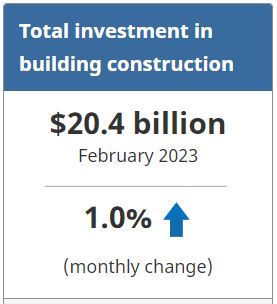Statistics Canada: Investment in Building Construction, February 2023
Investment in building construction went up 1.0% to $20.6 billion in February, with all components posting gains. The residential sector rose 1.1% to $15.0 billion, while the non-residential sector was up 0.8% to $5.6 billion.

On a constant dollar basis (2012=100), investment in building construction increased 0.2% to $11.9 billion.
Single-family home construction in Nova Scotia helps drive residential investment
Investment in residential building construction advanced 1.1% to $15.0 billion in February, with single-family home investment (+1.3%; +$102.8 million) contributing the most to the growth. Most notably, Nova Scotia recorded its largest monthly dollar increase for the single-family component (+19.9%; +$47.5 million) since March 2013.
Multi-unit construction increased 0.8% to $6.9 billion, mostly driven by Ontario (+7.6%). On the other hand, Quebec continued to contract, with its ninth consecutive decline since reaching its peak in May 2022.
Non-residential construction investment increases for ninth straight month
Investment in non-residential construction increased 0.8% to $5.6 billion in February, with Ontario leading the gains in every component.
Industrial construction investment rose 1.1% to $1.1 billion in February and was up 23.1% year over year. This was the 15th consecutive monthly increase. The steady increase was largely driven by the mining and agriculture subcomponent, up 61.1% from December 2021 to February 2023 on an unadjusted basis.
Commercial construction investment was relatively stable in February, up 0.5% to $3.1 billion. Both Ontario and Manitoba continued to climb for the sixth consecutive month.
Institutional construction investment was up 1.0% to $1.4 billion in February. The construction start of an educational building in Kelowna, British Columbia helped contribute to the overall growth in the month. Conversely, Newfoundland and Labrador posted its 16th consecutive monthly drop in February, leading to its lowest recorded value since June 2018.
For more information on housing, please visit the Housing statistics portal.
Note to readers
Data are subject to revisions based on late responses, methodological changes and classification updates. Unadjusted data have been revised for the previous two months. Seasonally adjusted data have been revised for the previous three months.
Data presented in this release are seasonally adjusted with current dollar values unless otherwise stated. Using seasonally adjusted data allows month-to-month and quarter-to-quarter comparisons by removing the effects of seasonal variations. For information on seasonal adjustment, see Seasonally adjusted data – Frequently asked questions.
Monthly estimates in constant dollars are calculated using quarterly deflators from the Building Construction Price Index (table 18-10-0135-01). Typically, the first two months of a quarter use the previous quarter’s price level, and the data are revised when the new quarterly price index becomes available.
Detailed data on investment activity by type of building and type of work are now available in the unadjusted current dollar series.
The trade and services subcomponent includes buildings such as retail and wholesale outlets, retail complexes, and motor vehicle show rooms. More detailed information can be found on the Integrated Metadatabase at Types of Building Structure – 2.2.1 – Trade and services.
Next release
Data on investment in building construction for March will be released on May 17.
Products
Statistics Canada has a “Housing Market Indicators” dashboard. This web application provides access to key housing market indicators for Canada, by province and census metropolitan area. These indicators are automatically updated with new information from monthly releases, giving users access to the latest data.
Source: Statistics Canada

